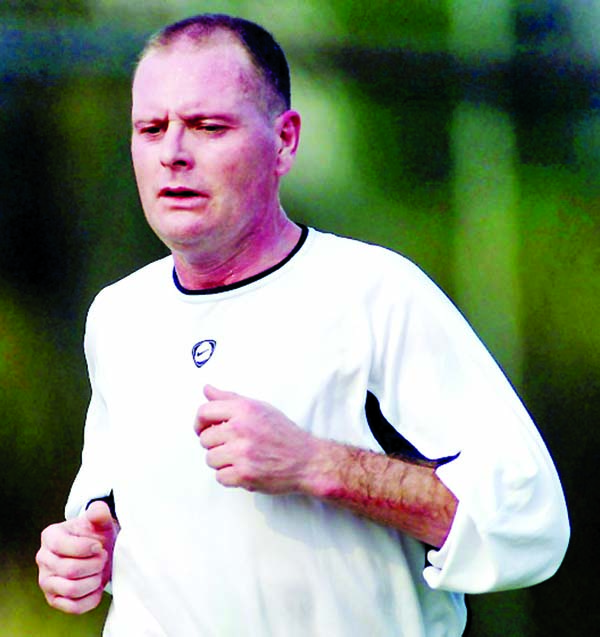
England maverick Paul Gascoigne was playing a friendly match against Chinese media when he abruptly sat down, conjured a toothbrush from his sock and began cleaning his teeth.
It was classic Gazza-the brilliant, joke-loving but troubled midfielder memorably labelled “daft as a brush” by his former England manager Bobby Robson.
Gong Lei recalls this and other stories with great fondness during an interview with AFP reflecting on Gascoigne’s brief time as a player-coach in China in 2003.
Gascoigne, who recently turned 53, was the first foreign football star to play in China and scored two goals in four games for second-tier Gansu Tianma in the fading days of his career.
Gong was head coach and the two became good friends. To Gong’s regret, they are no longer in touch.
Gascoigne, the former Newcastle United, Tottenham Hotspur, Lazio and England star, referenced Gong in his book “Gazza: My Story.”
“The manager of the club was 38, so not far off my own age, and he spoke some English. I liked him.”
The feeling was mutual.
“He was like a knight on the football field but a gentleman in life,” says Gong, now 54, a former player and coach who is now a pundit on Chinese television.
“He was brave on the field, not afraid of injury, motivated and had great technique. When he was hurt, he didn’t care. He just has a big heart.”
In his book, Gascoigne described how while in China he was so desperate to go fishing that he used biscuits as bait and caught a carp in a hotel ornamental pool.
But for all the madcap stories, Gong says that Gascoigne suffered crippling homesickness in Gansu, a province in northwestern China that even now is among the most underdeveloped in the country.
The team was based in Lanzhou, a city better known for its noodles than its football.
“He would cry on my shoulder because he felt that I was a good friend, his confidant, the person who gave him the chance to play football again. He would thank me-but I said there was no need,” said Gong.
“I told him that he just needed to get on the field and play happily, and that he was making such a great contribution to our team, and the fans appreciate your skills.”
By his own admission, Gascoigne, who says his contract was worth about 400,000 pounds for a year (about $640,000 at the time), began to drink to numb the homesickness and boredom of being alone in his hotel.
A severe knee injury and heavy drinking had taken its toll on the career of Gascoigne, one of the most gifted midfielders England has produced, and China was to be a lucrative last hurrah.
Gansu tried their best to keep him busy with training and taking him to restaurants and tourist spots.
“He was homesick sometimes because he had children and a family, and money problems,” says Gong.
“When he was homesick and lonely he would drink to ease his worries.”
With the drinking came the sugary food-Gong says that Gascoigne’s room was full of chocolate.
On anti-depressants, anxious and unable to sleep, Gascoigne left China and never returned.
He fell out with Gansu, saying he was owed money. Gong says that the outbreak of the SARS virus was a major reason why Gascoigne left.
For all that, Gong remembers the Gascoigne who was so down-to-earth that he would turn up at airports in his slippers.
And the Gascoigne who so afraid of flying that his sweaty palms would grip Gong’s hand when they were on planes.
Gong has one more thing to add, and he switches to halting English to stress his point.
“Please say ‘hi’ to Paul for me,” he says.
“I miss him so much.”

